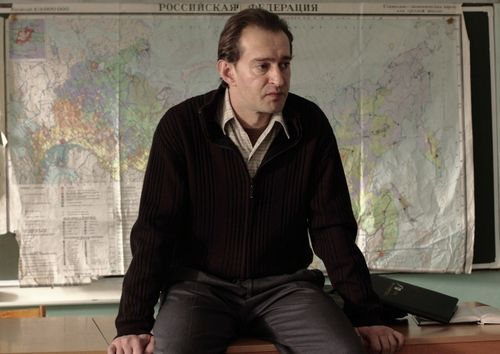A lost hemisphere

The film The Geographer Drank his Globe Away, based on the homonymous novel by Alexei Ivanov, is among the top-grossing movies released in Russia. It is drawing audiences and receiving rave reviews. It won the main prize at the Kinotavr festival in Sochi. It is also running – quite successfully – in Ukraine.
The film’s director Aleksandr Veledinsky debuted in television (in particular, as co-scriptwriter of the serial Brigade). The Geographer… is his third full-length movie preceded by Russian (based on Eduard Limonov’s prose) and Alive, which drew mainly commendable comments.
The Geographer… is a number of scenes in the life of a rank-and-file Perm resident Viktor Sluzhkin (Konstantin Khabensky). He is one that may be called loser. At first he is unemployed, then a teacher of geography (a subject he does not in fact know) who is paid a starvation salary. He takes to the bottle. His wife no longer loves him. On the contrary, Viktor loves her but still womanizes on the side. He also has quite a successful friend, his complete antipode.
If this reminds you something, yes, you are right… You can draw some parallels with Flights in Dreams and in Reality directed by Roman Balaian and starring Oleg Yankovsky and A Vacation in the Fall, a TV film by Vitaly Melnikov, based on Aleksandr Vampilov’s play, and with Oleg Dahl in the main role.
In other words, it is an attempt to put across an eternal Russian story about a “superfluous” man which Russian art presents in various forms – from Pushkin and Lermontov onwards.
Actually, the film more or less sticks to the ancient paradigm in the first part. By genre, The Geographer Drank his Globe Away reminds of a situation comedy, but still, in the beginning, it is almost the well-known bitter laughter that disguises the outwardly invisible tears. Khabensky ties to cut the figure of a seemingly funny man who balances on the verge of an existential abyss. To tell the truth, the other actors fail to achieve this level.
The problem of characters like Sluzhkin is in their alienation from reality and deep inner dissonance, rather than in when to sleep with which woman. The breakup of the family and drinking are only the symptoms, not the disease itself. But, in an attempt to develop the plot, Veledinsky somewhat harms the film. The description of relationships with women and schoolchildren looks at times as a run-of-the-mill soap opera that fills the mental space in the film’s second part. A badly-played melodrama mixes with a mediocre education novel, not to mention rather serious problems with the level of acting, especially on part of young performers.
Globe is a slang word for head. Sluzhkin drinks his globe away, sinking into the ever-growing social madness. The director missed a good chance to portray a whole generation of the lost, superfluos and disillusioned Russians through the life story of one loser and to diagnose the current time span, but it is not the fault of Veledinsky alone. He failed to find the right words, but perhaps nobody else really has any.






